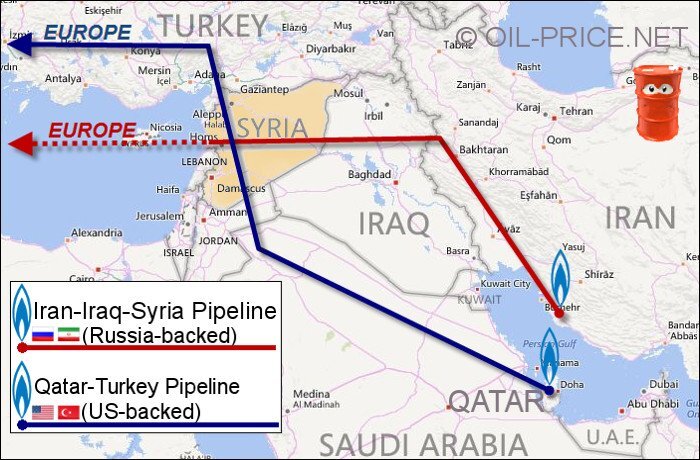What the heck just happened ? An in-depth analysis on Syria's collapse.
Just when Israel seemed defeated and signed a ceasefire agreement, the Syrian front was reopened
To everybody's surprise, the Syrian government of Bashar al-Assad evaporated under the jihadi blitz that first developed from Idlib in the north and was then supported by Syrian Free Army militias from Daraa in the south. It all began with a "surprise" offensive that saw rapid rebel advances onto Aleppo. Sleeper cells inside the city were activated, and the Syrian army decided to retreat from Syria's second-largest city two days later. Iran had warned al-Assad two months before that something was brewing. Israeli jets bombed all bridges between Lebanon and Syria three days before the attack to prevent Hezbollah from coming to Assad's aid. The Syrian army still seemed totally unprepared.
Sensing the weakness, the jihadi mercenaries from Hayat Tahrir al-Sham (HTS), under notorious ex-ISIS and ex-al-Qaeda leader Al-Jolani, pushed onward toward Hama. Hama was quickly half-encircled, and Assad's forces pulled back once again without hardly any resistance. The next stop was Homs, which fell just as quickly. Meanwhile, Syrian Free Army forces pushed from the south into Damascus. Bashar al-Assad and his family, it was announced, had received political asylum in Russia.
All in all, 800 people are said to have lost their lives. Syria collapsed without any battle. Neither Hezbollah, Iran, nor Russia came to Syria's aid. The world was left scratching their heads. What had just happened?
Syria, one of the seven countries that were to be taken out in the Middle East
It really started in 2010 when the Qataris kindly asked to be allowed to build a gas pipeline through Syria to bring gas from the biggest gas reserves that lie in the middle of the Red Sea, right between Qatar and Iran, to Turkey, from where it was to be delivered to its big market, Europe. Assad declined as he preferred his Iranian allies. Russia, of course, preferred no pipeline at all. It has been reported that the Qataris made direct threats to Assad, and sure enough, two years later, a regime change attempt was started.

The Syrian Arab Spring followed the playbook of other CIA-run regime change attempts. Pro-democracy NGOs and a well-oiled media campaign whipped up emotions, and then some gunmen appeared and created havoc. This was Obama's war. His Secretary of State, Hillary Clinton, organized a weapons "rat line" from Libya, where Gaddafi had just been overthrown and jihadi factions were tearing up the country. The British MI6 created the White Helmet goup, a bad copy fo the Red Cross, that propomted the djihadi cause.
In a rather surprising event, which resembles much the disintegration of Syria, 1,500 ISIS fighters overran Mosul, where 30,000 soldiers just dropped everything and ran. They then drove an army's worth of brand-new US weaponry unmolested into Syria to overthrow al-Assad and install their caliphate. No US airplanes were seen in the flat desert lands between Mosul and Deir ez-Zor. That is when the war really got started.
Not only jihadi forces but also the YPG—PKK terrorists that changed their name to appear more moderate—chipped away from government-controlled land. Horrible massacres were committed by the jihadis. Endless publications informed us of beheadings, mass killings of soldiers marched into the desert, mass rapes, Yazidi women in cages sold into slavery, and more. A majority of Syrians, especially the religious minorities, chose to support the government in the hope of protection.
ISIS was two weeks away from storming Damascus when Russia intervened. Invited by the Syrian government, Russia sent a batch of 29 or so MiGs and more helicopters, and suddenly the fortune shifted. Hezbollah and Iranian forces joined the fight. Slowly, in bloody battles, the Syrian army was able to push back the head-chopping mercenaries. Unfortunately, the US and Turkey intervened and prevented the Syrians from defeating the jihadis completely. Idlib was not to be touched, and also the YPG had to be left alone. The Kurds had occupied the oil-rich eastern Syrian desert. US troops installed a military base in Al-Tanf, right on the border triangle between Syria, Iraq, and Jordan.
Syria won the war in 2020 but was left under crippling western sanctions without its oil and with huge areas outside its control
The war was a sick example of a multi-pronged proxy war, with everybody fighting everybody else. While the US financed everybody willing to fight—following the motto that "my enemy's enemy is my friend"—Turkey favored the Sunni jihadists of HTS, al-Qaeda, and ISIS. The US and the Israelis heavily financed the Kurds. Israel was the first to open an embassy in the new Kurdish state of "Rojava." Turkey's president, Erdogan, was stinking mad and has been fighting the Kurds on all fronts. Thus, we have seen US-financed HTS fighting US-financed Kurds, fighting US-financed ISIS and al-Qaeda.
Poor Bashar al-Assad, who had wanted to become an ophthalmologist but was thrown into power upon the death of his father, was left with a ravaged country with no resources to rebuild it. His need during the war to ally with military forces against the jihadis had created power centers outside government scrutiny that allowed the state to drown in corruption and mismanagement.
The question on everybody's mind: Why did the Syrian army not fight back ?
The complete lack of any resistance caught even the best Middle East expert by surprise. How did this happen ?
Various theories are proposed.
Some believe that army generals had just been bought off with suitcases full of money and sweatheart deals. Others believe it is a Russian trap for the west to nail them down and bleed them dry just like in Afghanistan. The truth might be somewhere in the middle.
Syria had won the war but was left without oil, without its industrial hub in Idlib, under harmful American sanctions, and with vast areas outside its control. This country, totally ravaged by years of war, needed billions of dollars for its reconstruction. In recent years, Assad turned to the Gulf states, hoping to attract financial investments and regain a place within the Arab community. The door was open, and the path seemed promising. He refused dialogue with Erdogan, rejected offers of assistance from Hezbollah and Iran, and did not request intervention from Russia.
When HTS attacked, the army was financially at its breaking point. A soldier was receiving $7/month in salary, a general $40. A jihadi mercenary makes 2000$/month. It seems that Bashar al-Assad, along with his army, simply threw in the towel and left.
What comes next ?
Syria's future looks bleak. Will it end up like a failed state with endless civil wars, like Libya or Iraq? Or will it be divided between Turkey, Israel, and the Kurds and disappear altogether ? Turkey, which already created a ten-kilometer-wide "security buffer zone" on large parts of the Syrian-Turkish border, now eyes Aleppo.
Israel immediately occupied the Syrian Golan and moved troops deep into Syria to create a security zone, which it promises to keep forever. It is one step closer to its Greater Israel. The zionist state has, in an amazing jujitsu move, undone the axis of resistance. Hezbollah is now unable to resupply high-tech weapons from Iran. And Iran, with Saudi Arabia the last on Wesley Clark's list of countries to be overthrown, will feel much exposed. Bibi Netanyahu has survived into yet another round.
What is for sure is that the tectonic plates of the Middle East have shifted. Borders will be redrawn, the big powers have tasted blood. More wars loom on the horizon. The syrians look forward to a very bleak future.
At least for Bashar al-Assad, the nightmare is over for now. He might finally be able to open his medical studies and live a normal life with his family.


